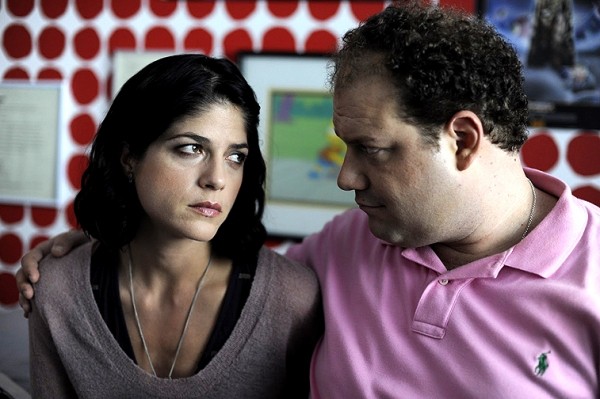
- Dark Horse
Director Todd Solondz had his moment in the … well, we’ll call it “sunshine” with 1998’s Happiness, a spectacularly assured downer that somehow served as the missing link between John Waters and Ingmar Bergman. Featuring a top-notch cast eager to hit the muck, it worked as a brazenly caustic inverse to the Pulp Fiction-fueled trend of indie films; where Tarantino and his spawn featured characters getting high on their own gift of gab, Solondz’s universe was populated by a bunch of mumbly schlubs either completely oblivious to their own awfulness or praying for spontaneous combustion. It was strangely cathartic, in a double-negative sort of way.
The mood may have caught on—the current wave of humiliation comedy typified by The Office seems unthinkable without Solondz’s squelchy first steps—but its creator never quite did. Despite some interesting experiments with formalism (particularly the multiple-choice heroine of 2004’s Palindromes) the filmmaker’s later projects have had difficulty hitting the same uneasy peaks, no matter the number of busted taboos. When there’s nowhere to go but down, there’s only so far you can go. Dark Horse, Solondz’s first film since 2009’s kinda-sorta Happiness sequel Life During Wartime, finds the director back to his familiar New Jersey haunts, but to noticeably diminished effect. While he can still occasionally come up with a moment that pins your ears back, his particular brand of bad-to-worse now seems almost quaint.
Kicking off with an unexpectedly perky wedding scene, the film follows Abe (Jordan Gelber), a 30-ish action-figure collector still living at home with his folks (the dream tag-team of Christopher Walken and Mia Farrow) and mushrooming in the shadow of his successful brother. While working at his dad’s office, his daily routine of eBay bids and angry rants are disrupted with the appearance of a severely depressed woman (Selma Blair) with a stunted home life of her own. After she shows little resistance to the idea of a first date, his belief in their chemistry leads him to propose marriage immediately. When she unexpectedly accepts, the downward spiral hits warp speed.
Solondz, working with his regular cinematographer Andrij Parekh, still has a knack for creating a world that is somehow both hyper-real and terminally drab, with a backdrop of strip malls and ranch houses that reflect the main character’s stunted rut, as well as providing ample reason for his frequent flights into fantasy. Toys “R” Us, the location where Abe repeatedly acts out his worst impulses, refused to have their logo shown in the film, probably wisely.
The filmmaker’s popularity may have waned, but his ability to assemble a stellar supporting cast thankfully remains. Blair—playing what the end credits suggest may be the same character from the earlier Storytelling—finds some unexpected depths in her surface one-note character, with some wrenching moments of past life flickering from the gloom; her response to their first kiss is the film’s crowning moment of oogy glory. Also just right is Farrow, whose indulgent over-mothering makes a perfect counterpoint to the hilariously toupeed Walken, who somehow quadruples his standard thousand-yard stare. The real revelation, however, is Donna Murphy as a mousy office drone whose attitude toward Abe morphs unpredictably between supportive friend and voracious cougar. No matter how ludicrously dire the situation gets, when she’s on the screen, the urge to wince temporarily washes away.
It all keeps coming back to Abe, however, whose perpetual flailing keeps the film in cruel cartoon land. The premise of a resistant-to-change man-boy stumbling across love is certainly a subject ripe for laceration, especially in the wake of Judd Apatow’s success. Even the viewers most receptive to the concept, however, may find themselves taken aback at Dark Horse’s central figure, who comes across as less of a character than an assortment of the worst fanboy traits imaginable, fused together Voltron-style. (If you got that reference, prepare for some serious cringing.)
Driving a canary-yellow Hummer and claiming persecution at the slightest rebuke, he remains a protagonist for which it is impossible to work up much sympathy, even when things are at their lowest. Which may be the point, but still.
DARK HORSE
![]()
Jordan Gelber, Selma Blair, Mia Farrow
Not Rated